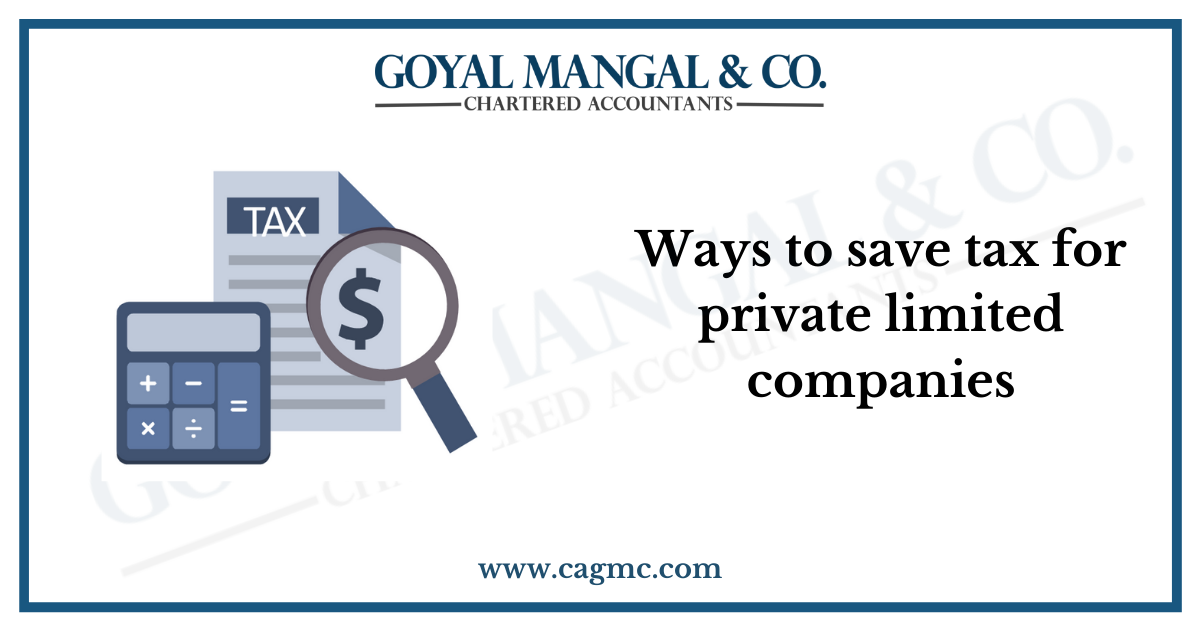| Content
What is a private limited company? |
Company is an artificial person created by law it is clothed with many rights, obligations, powers and duties prescribed by law.

WHAT IS A PRIVATE LIMITED COMPANY?
A Private limited company is a company having private identity that formed lawfully with limited liability or legal protection for its shareholders but that places restrictions on its ownership. Amongst many obligations, paying tax is one of the main obligations of a company.
No doubt we cannot avoid this tax payment (and we should not, after all it’s for nation building), but yes certain tax planning steps during the year can provide extra monetary benefits. Here are some taxes planning tips which can be adopted by every private limited company to enjoy such benefits.
DEDUCTIBLE EXPENSES
Salary to directors:
If any person is a founder or director of the company then his/her main motive is to earn the maximum profits. This is to be taken by the directors in profit sharing ratio which is always pre decided as dividend.
To save taxes directors can receive that profit as salary instead of in form of dividend. Salary to directors or founder is allowable as expense for a private limited company. Hence benefit can be taken by effective tax planning.
Sitting fees to director:
A company may pay fees to its director for attending meetings of board or committee. Director’s sitting fees is decided by BOD which should not exceed Rs.100000. As accordance to section 194J of Income Tax Act, 1961, any remuneration or fees or commotion by whatever name is provided to the director is liable to deduct @10%.
Hence it will provide benefit to both the hands i.e.in hands of company, it can be claimed as expenditure and in hands of director it is exempted to the extent of limit provided.
Preliminary expenses:
Preliminary expenses are incorporation expenses which are incurred before or after the incorporation of private limited company. These are to be borne by the founder of the company such as professional charges paid for drafting of AOA and MOA, fees paid to registrar, stamp duty paid, etc.
Generally, these expenses are not to be taken into account but by book keeping of these expenses tax saving benefits can be enjoyed with proper documentation.
Rent expenses:
If the place of registered address of the company is actually on rent then it’s no deal, but if it is on the name of director or name of relative of director then this rent expenses can be booked in the books. Such expense can be booked only if an agreement is there with the owner of the place.
So, rent expenses can be booked and duel tax benefits as discussed in above points can be enjoyed freely.
Capitalizing capital asset and depreciation:
If any asset is purchased for company and it is going to provide benefits in generating revenue for more than a year , then it should be capitalized rather then showing it as expenses. It means the asset must be shown in balance sheet instead of in profit &loss statement.
After showing the asset in balance sheet it should be depreciated as according to its useful life. Hence it will provide. Hence it will provide tax benefits to the ultimate years.
Salary of family members:
Sometimes family members or relatives help us in doing business works which is done at free of cost by them, but as a good tax planner such expenses must be recorded in the books of company.
So that indirectly the profit has gone into your hands with exemption of that expense from the taxable income of company.
Entertainment expenses:
It is most common and exciting expense of business which incurred periodically in celebrating business success with family or partners.
So as a good tax planner one should never let it to go freely. It must be accounted properly in books to get a flat discount of 30% on your party bill by book keeping the same in books and get tax save of 30%.
Director’s vehicle expense:
Companies usually do not own its own vehicle and normally one of director’s vehicles is used in the business for travelling and meetings. Not just fuel but also repair maintenance of vehicle is charged as business expenses.
These expenses will save 22% to 30% of tax of the companies. Company should plan the proper expenses the above expenses required proper documentation and planning to take the maximum and true benefit of it.


